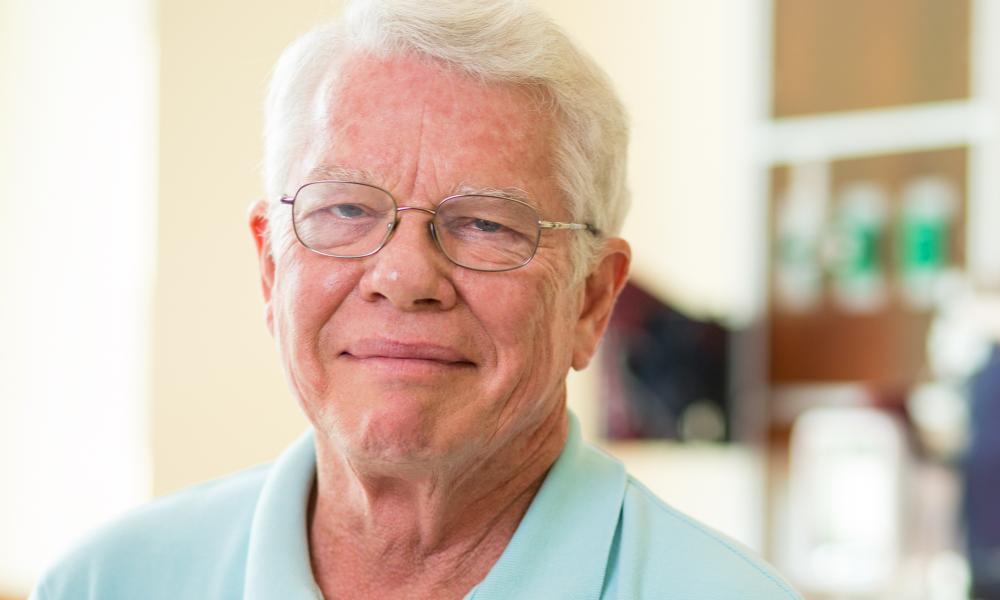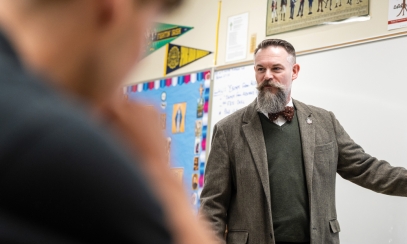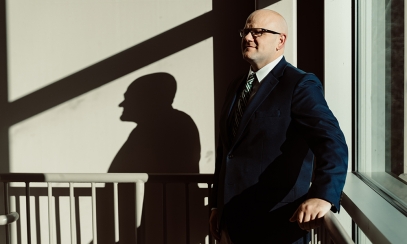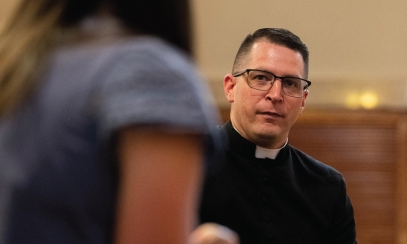
Deacon Tom's hospital ministry is a 'liturgy of the bedside'
“Liturgy of the bedside” is how Tom Franklin, deacon at St. Mary in Chelsea, refers to hospital ministry. For him, hospital ministry is a passionate symphony of the co-mingling of faith and life with sickness, and possibly death. “Hospital ministry is a relational ministry, a ministry of encounter. It is making present the love and care of Jesus, in whatever guise he would be recognized by the patient,” he says.
On the three days a week Deacon Tom volunteers, he carries a full pyx (the small receptacle to carry the consecrated hosts), along with his invisible patient care bag crammed with compassion, empathy, prayer, reverence, presence and even laughter. He will spend between two and six hours dispensing these charisms among the patients at St. Joseph Mercy Hospital, Chelsea. He explains, “Each day, I get a census listing each patient’s name and religious preference. This gives me an assist before I walk into someone’s room. Some who state they have no religious preference will often say, ‘Yeah, I once was a Catholic [or Lutheran or Baptist].’ They often have a story to go with that statement.”
After 20 years in this ministry, Deacon Tom is well aware that healing within a hospital setting is not just physical, although, he says, “Sometimes positive physiological changes are visible on the patient monitors after I have prayed with them.” For some, Deacon Tom says a visit with a hospital minister “may be a catalyst for change, an opportunity to unburden any faith baggage so they can begin the spiritual healing process. An important part of this ministry is to help people find a safe place to unpack their faith baggage. One of the most important things is for the prayer I pray with them to be in context with their life and their current hospitalization.” It can be paradoxical that treatment for a physical ailment is the vehicle to discovering a salve for the soul.
He recalls: “One person I visited made it clear he did not want anything to do with God. For weeks, he was in a coronary care unit that was unable to identify a source for his heart issues, and powerless to get him well or release him. The patient was hostile at my initial visit, so I told him I would come back. Over a period of subsequent visits, his story came out: During a turbulent time in his life, he had done some things he deeply regretted, so he went to confession. The priest’s reaction was to tell him the Church had no place for someone like him. He carried that burden for 30+ years. After a time, I asked if I could bring a priest to anoint him, and he agreed. He participated in the sacrament of reconciliation and the sacrament of the sick. Two days after receiving these sacraments, following weeks of mystifying the medical staff, this man was well enough to be discharged.”
Deacon Tom says, “It hurts to know that some cleric would do this. Often, we hear stories of people’s wounded encounters with a church. These stories occur in all denominations, not just Catholic. But I get to be on the other side and be part of the healing process. Sometimes, a breakthrough with a patient is tantamount to the veil in the Temple being rendered. The whole episode is as if God is saying, ‘I can no longer tolerate separation. I will not take it anymore.’”
In general, Deacon Tom explains that most patients simply want affirmation that “God loves them – that God cares. There are a lot of folks who believe God created their circumstances to punish them or shape up their family. A lot of this ministry is sharing that God does not sit up there and dole out infirmities. Rather, God is present in their situation. I refer to Jesus in Gethsemane, or on the cross crying out, ‘Why are you abandoning me?’ Some may say they prayed to Jesus and their prayer wasn’t answered. I remind them that Jesus also asked for his cup to be passed, and it wasn’t. I assure them that Jesus has been in their shoes, and is well aware of how they are feeling.
He continues, “I am humbled by some of the patients I meet, and their deep understanding of who God is and how they relate to him. They give joy-filled witness in the face of some daunting burdens they carry. They get the fact that, while this is a pretty crappy time in their life, in terms of eternity, it is just a passing moment.”
Hospital ministry can also affect and affirm a patient’s family. Conversations occurring during a liturgy of the bedside can bring comfort and clarity – and open a spiritual door previously closed – to all present. It can clear up religious misconceptions and give patients, as well as family members, an opportunity to discuss different aspects of their faith journey. In the event of impending death, “I think the family appreciates when we enter into a relationship with them and acknowledge the dying family member is a real person. We give honor, respect and care as we wait to hand them up to God,” he says.
Deacon Tom reflects, “This ministry has shaped me and formed me and caused me to see the beauty in the people of God, especially in those members who don’t realize they are the people of God. Outside of the hospital, it shapes my homilies and my marketplace ministry, and makes me more compassionate. It gives me a window into the heart of God.”
Learn More
If you would like to visit or take Communion to patients in your area, contact your local parish or the pastoral care department at your local hospital. You may also contact the Listening Ministry at the Diocese of Lansing at 517.342.2471.



